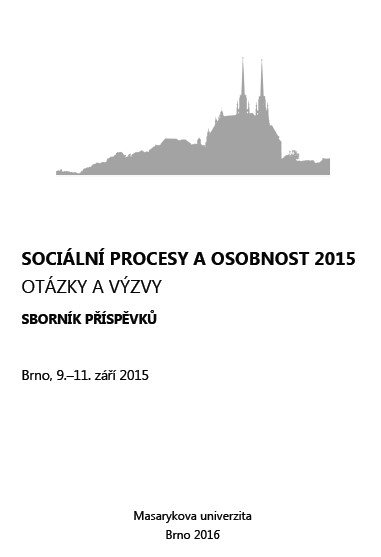Vývinové ciele v období nastupujúcej dospelosti v kontexte adaptívnej sebaregulácie
Developmental tasks in emerging adulthood in the context of adaptive self-regulation
Author(s): Beáta Ráczová, Veronika Zibrinyiová
Subject(s): Developmental Psychology, Psychology of Self
Published by: Masarykova univerzita nakladatelství
Keywords: Emerging Adulthood; Developmental Tasks; Adaptive Self-Regulation;
Summary/Abstract: Emerging adulthood is a transitive developmental period, in which young people at the age of 18-25 are only gradually dealing with life tasks typical for adulthood. Goals, once characteristic for adolescence, are in modern societies moved to the higher age (Arnett, 2006). Tasks of the adult age are updated increasingly, and their importance grows with age, therefore one of the aims of this research was to examine how important are these tasks for young people, which specific tasks they prefer and to find out if there are any gender differences. The process of goal achievement is explained by the concept of self-regulation (Carver & Scheier, 2011) as the ability not only to choose and achieve the goals, but also modify the behavior in such way, that it will lead to their achievement (Lovaš, 2011). Transitive periods, such as emerging adulthood, are connected with the need to review and adjust one’s life goals. The ability for goal disengagement and reengagement of unattainable goals is a manifestation of adaptive self-regulation (Wrosch et al., 2003a, b). Research sample (N=102, 51 females, 51 males) filled in three research methods: newly constructed questionnaire The Importance of Developmental Tasks, Short Self-Regulation Questionnaire (SSRQ, Carey, Neal & Collins, 2004) and Goal Adjustment Scale (GAS, Wrosch et al., 2003b). Results in the context of benefits and limitations are discussed in the conclusion
Book: Sociální procesy a osobnost 2015. Otázky a výzvy: Sborník příspěvků
- Page Range: 384-390
- Page Count: 7
- Publication Year: 2016
- Language: Slovak
- Content File-PDF

